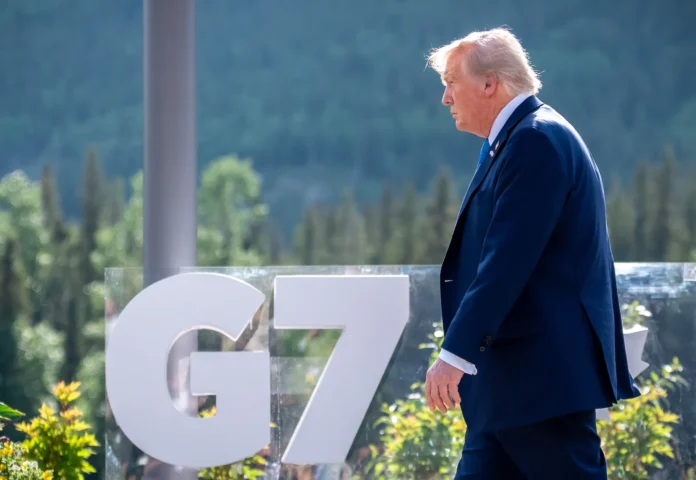The Trump Iran‑Israel strategy took center stage Monday as President Trump left the G‑7 summit in Canada. He skipped the final day to focus on the conflict. This move sparked fresh debate in Washington and on Wall Street.
From Air Force One reporters asked Trump about his goals. He made clear he wanted “an end. A real end,” not a temporary ceasefire. That phrase underlined his firm stance against Iran’s nuclear ambitions. Moreover, he hinted at diplomacy but emphasized negotiation only if Iran “does the deal.”
Meanwhile, the conflict has entered its fifth day. Iran launched ballistic missiles at Israel, which countered with focused strikes on depots and command centers. Israel Defense Forces said it intercepted most missiles before they reached Israeli skies. Later, a drop in launches indicated Tehran might be de‑escalating.
However, the violence struck a serious blow. Israel’s largest oil refinery shut down after a missile hit. Three workers died. That plant supplied 70 percent of Israel’s domestic fuel. So markets and energy analysts watched war clouds gathering over OPEC’s eastern edge.
On the G‑7 front, Trump exited early to weigh U.S. options. He mentioned possibly sending envoys like Vice President Vance or special adviser Witkoff to Iran. Yet he admitted uncertainty: “I’m not too much in the mood to negotiate.” His tone signaled a hawkish posture and preference for decisive results over temporary calm.
Still, Israel struck Iran’s military facilities and nuclear sites daily. Ground analysts reported damage to enrichment centers at Natanz and Fordow. Israeli Prime Minister Netanyahu said they aim to destroy Iran’s nuclear threats and ballistic missile capacity.
In Washington, officials reacted cautiously. The USS Nimitz carrier group is heading to the Middle East. Yet the White House denied any plans for direct U.S. combat intervention. Spokesperson Alex Pfeiffer said U.S. forces remain defensive only.
Next, the Pentagon will brief Congress on Middle East moves. Meanwhile markets reacted with a moderate risk-off tone. Oil prices nudged upward but did not spike sharply. Analysts now question whether this is a lasting downturn or only a brief market wobble.
Furthermore, Trump’s abrupt exit from Canada triggered criticism from allies. They worried the abrupt departure might undercut G‑7 unity. Some diplomats voiced concern that the Trump Iran‑Israel strategy could fracture traditional alliances and diminish U. S. influence.
Still, while uncertainty lingers, most players expect careful diplomacy. Iran’s President warned of proportionate response to any further strikes. Israel vowed to continue until threats end permanently. Now markets, governments, and voters await the next U.S. move.
Ultimately, pundits say the Trump Iran‑Israel strategy will shape future U.S. policy. As events develop this week, Americans and allied nations alike will watch how diplomacy, deterrence, and defense strategies balance out on the world stage.
For more political updates, visit DC Brief.


